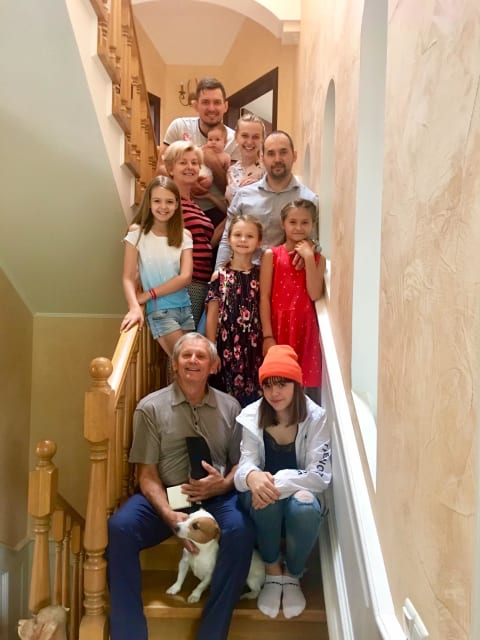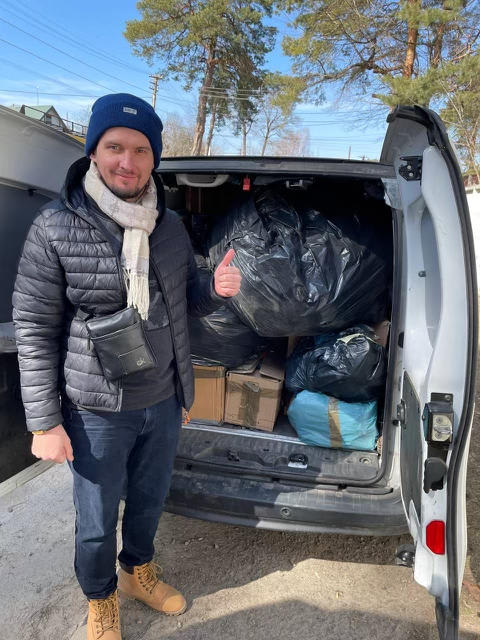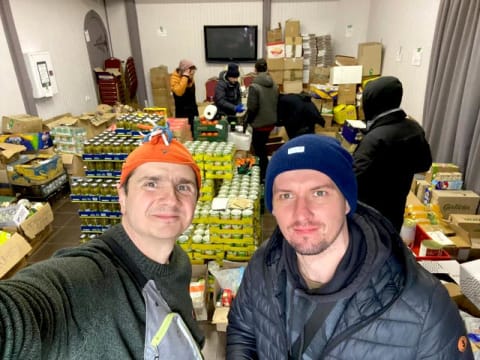
The Call of Courage
Story 98
By Kirsten Cutler
As an orthopedic surgeon, Dr. Timothy Galan’s training prepared him for the stress and the demands of the operating room. But it did not prepare him for what his family has been facing over the past few weeks. He was scrubbing in for an evening surgery on February 23 when he heard the news.
“My colleague told me, ‘It's started,’” Galan recounts. “I said, ‘What started?’ And he said that there were bombs exploding in Kyiv and all over Ukraine, and there was troop movement across the border.”
As soon as surgery was over, he called his father in Kyiv, who was scrambling with the crowds to fill up his gas tank. “Nobody anticipated this would happen,” Galan says. “I could hear explosions through the phone, and he kept saying, ‘Did you hear that?’”
“I could hear explosions through the phone, and he kept saying, ‘Did you hear that?’”

A few days later, Galan’s family – which includes his parents, three brothers, their families, aunts, uncles and cousins – decided the safest thing to do was relocate to a family home three hours outside of the city.
“My aunt lives on a farm, basically, in the middle of rural Ukraine – as rural as you can get,” Galan shares. The home became a transition hub for other families who needed help relocating to safety in the early days of the conflict. Galan’s brothers initially joined local resistance units.
“Pretty much every Ukrainian answered the call and joined some form of resistance,” Galan explains. “They do whatever needs to be done to defend towns, villages, any form of administrative or residential district.”
The work of the resistance units included setting up roadblocks to slow down the movement of tanks, staffing checkpoints and patrolling for safety. But Galan’s brothers soon answered a different call, transitioning to the work of distributing goods, services and aid between Lviv – a city near the border with Poland – and Kyiv.

“My oldest brother did a couple of runs to Kyiv, back and forth, to transport people and food and supplies,” Galan says. “When people left their homes, they left without even thinking to take anything that they needed, like medication and important documents.”
Several weeks into the conflict, Galan speaks with his family at least three times a day. He has also been connecting with medical supply manufacturers in hopes of getting basic but vital supplies donated to Ukrainian hospitals in desperate need.
“They're severely lacking basic necessities to perform surgeries,” Galan says, including inexpensive tools like cautery equipment, which are lifesaving in a time of crisis. “There are thousands and thousands of wounded.”
“When people left their homes, they left without even thinking to take anything that they needed."

While he spends every free minute trying to help his family, friends, and the people of Ukraine, Galan is astonished by how people around the world have also been eager to help. To those looking for ways to help, he says to connect with credible international humanitarian organizations like the American Red Cross or ask your church how to support ongoing efforts.
Galan also urges people to not shy away from the topic of the conflict. “I want people to continue thinking and talking about it,” he says. “A step further would be to contact your representative or senator and remind them to help Ukraine as much as they can.”
Meanwhile in Bakersfield, California, Galan continues his daily work as a surgeon to help people heal from injury and stay healthy. The family and friends always on his heart have given him a new perspective on his calling – and when people ask him how he’s doing, he replies with the question often on his mind.
“I think it's about the Ukrainian people right now,” he says. “How do they function? That's the question.”
Related stories

Randi White

Jeff Musser

Juan De La Cruz

Central Coast Service Area | Celebration Event

Mara Bryant

Diana Erdmann

In His Footsteps

Gary Obreque

Heartbeat in a Bottle

Wes Rippey

Adam Lee

Erasmo Cortez

Camie Overton

Jayant Eldurkar

Heather Thompson

John Hay

Terry Johnsson

Cheri McCall

Valerie's Journey
